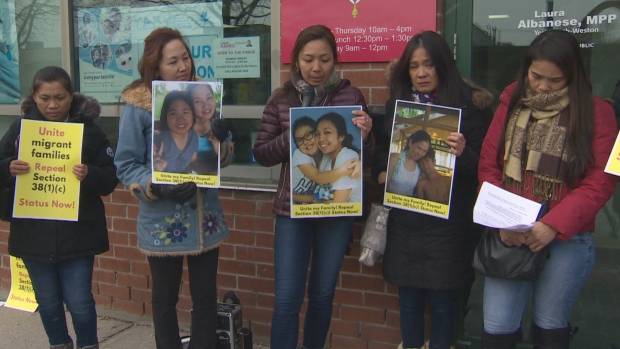
Migrant Caregivers Demand Ottawa Repeal ‘Demeaning’ Rules That Reject Immigrants On Medical Grounds
Dozens of migrant caregivers gathered in Toronto on Monday to demand that the federal government immediately repeal a section of a law that denies permanent residency to immigrants with disabilities.
More than 30 people rallied outside the Toronto office of Immigration Minister Ahmed Hussen in opposition to a policy that they say is discriminatory.
The group called upon the minister to repeal section 38(1)(c) of the Immigration and Refugee Protection Act, which it says denies permanent residency to an entire family if one member is sick or has a disability that would pose “excessive demand” on Canada’s health care system.
One thousand people and their families were rejected on this basis in 2014 alone.
A handful of caregivers, many from the Philippines, said the policy separates and divides families because it denies status to their children with disabilities. They said the policy means they cannot be reunited with their own families.
Some cried as they described the pain of being apart from their loved ones for years while caring for children not their own.
Mary Jane DeJesus, a former caregiver clutching a photo of her daughter Marie Claire, said she came to Canada in February 2010, applied for permanent residency in December 2012, and was denied because her daughter has Down syndrome.
DeJesus requested a judicial review of the decision through the Federal Court of Canada and won her case, but her file was referred back to the federal immigration ministry. She is working at Tim Hortons as she awaits a decision.
“I cannot accept that reality that they see my daughter as a burden,” she said. “She is not a burden. We work hard in Canada. We take care of other children. We left our family back home just to give them a better life.
“We want to be reunited with our family. I hope the government will do the right thing.”
John Rae, first vice chair of the Council of Canadians With Disabilities, a national organization that represents Canadians with disabilities, told the rally that the section should be repealed in its entirety and the federal government should have done so already.
“If you think of the current language, it is also very demeaning to disabled people. Consider what it says. It implies that we are a burden on the rest of you, on the rest of Canada,” Rae said.
“And it says nothing about the positive contributions that people with disabilities make every day in this country and in other nation states around the world. And the fact that we contribute to making Canada a more diverse country.”
The policy means people with academic qualifications and extensive job experience — “engineers, lawyers, doctors, you name it” — are denied the opportunity to come to Canada simply because they have HIV, Maurice Tomlinson, senior policy analyst of the Canadian HIV/AIDS Legal Network, said at the rally.
Most potential immigrants would qualify for private insurance and would not be a burden on the Canadian health care system, he added.
“This section discriminates on one category only: your health status. This is not the Canada I migrated to. This is not the Canada that the world knows, the Canada that embraces all and respects diversity. This section must go,” he said.
For its part, Immigration, Refugees and Citizenship Canada will provide a response to the policy in April, according to Hursh Jaswal, special assistant in the minister’s office.
“We understand the concerns raised by families looking to make Canada their home who are faced with this situation,” Jaswal said in an email on Monday.
The ministry is reviewing the policy and examining how it fits into the government’s accessibility agenda, he said. The ministry is also consulting with the provincial and territorial governments on the issue.
“Under the current provisions, officers determine excessive demand by assessing the health and social services required by an applicant, the costs of those services and the effect on waiting lists for care. No specific health condition results in an automatic rejection of an applicant.
“Each applicant is assessed on an individual basis and all applicants have an opportunity to demonstrate their ability and willingness to mitigate any cost impact on social services in Canada,” he said.
“Our goal is to strike the right balance between welcoming new members into Canadian society through a fair and compassionate immigration system while also protecting our publicly funded health and social services.”
Members of the Caregivers Action Centre, a grassroots organization made up of current and former caregivers, organized the rally.
Source: cbc.ca

